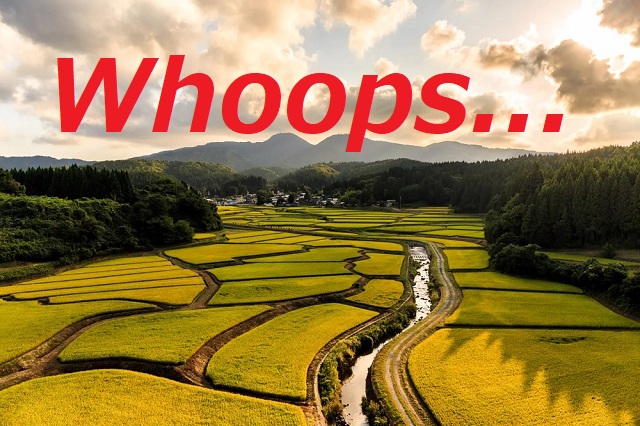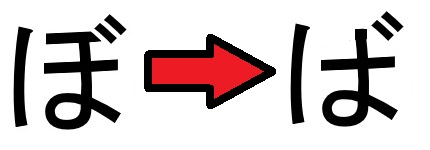
Mistake took months to be noticed, but it’ll be sticking around.
As we head towards mid-summer, Japan’s rice paddies take on extra-vibrant hues, and some become doubly beautiful thanks to the recent trend of rice field art. By planting differently colored strains of rice plants in carefully laid out arrangements in the spring, or strategically leaving certain parts of the field bare, come summer beautiful images will emerge as an agricultural mosaic.
Motoyama, Kochi Prefecture, may not get as intricate as the towns that put together salutes to Godzilla and Dragon Quest, but its farmers have been creating rice field art since seven years ago, often using rice to spell out messages in Japanese script, which itself has a highly artistic quality. For this year, as Japan continues to struggle under pandemic conditions, Motoyama wanted to boost the spirits of people across the nation, and so they chose to write out “Ganbarou Nihon!” or, “Hang in there, Japan!” Perhaps to give it an extra-friendly feel, they also decided to write ganbarou not in kanji characters, but in the more rounded type hiragana phonetic text.
▼ Ganbarou Nihon
But rice field art isn’t like creating with a pencil or brush, where you can see the results just seconds after deciding what strokes to take. Even after the farmers have planned everything out and planted the seeds, they still have to wait months in order to see it. Rice field art is also too large in scale to comprehend while you’re standing right next to the paddy yourself, so you need a raised vantage point to really appreciate it.
With summer here, though, it’s time to see how Motoyama’s rice paddy art turned out.
Pretty good, huh? Sure, the rustic penmanship (ricemanship?) might not please some overly strict calligraphy teachers, but considering the medium the farmers are working with, the message is impressively legible.
…except, wait. In the video, the rice art looks like this…
…and Ganbarou Nihon is this.
See the difference?
It’s a minor one, but that extra horizontal line in the third character changes the reading from “ba” to “bo.” So instead of Ganbarou/hang in there, Motoyama’s rice field art says “Ganborou,” which doesn’t mean anything.
▼ It’s not clear when anyone first noticed the mistake, but it was visible at least as early as June 28, when this video was uploaded to YouTube.
However, this doesn’t mean that Motoyama’s art project for 2021 is a failure, If anything, the rice-rendered typo is bringing the field extra attention, which is in turn bringing extra smiles to people’s faces, if online reactions like these are anything to go by:
“I can’t hate this.”
“I think it’s wonderful that they’re just rolling with it.”
“I’ve got no problem letting this slide. It’s cute and soothingly heartwarming.”
“Definitely made me smile.”
“It’d be cool if the town started selling manju sweet bean cakes with ‘Ganborou Japan’ written on them.”
“KWAII!”
There’s obviously no undo button for rice field art, but honestly, the mistake wouldn’t be too hard to correct if Motoyama really wanted to. Since the incorrect bo character is the one with the extra line, all they’d really have to do is bring in some sort of greenery to fill it in and effectively “erase” the problem.
▼ Like this
However, there are no plans to do that. “This is the charm you can only get from hand-made art,” said the local farmer’s organization, “and we could all use a little laughter as medicine these days.” And really, the reminder that things can still be good even when they’re not perfect, and that even if we make minor mistakes things can still turn out OK, is uplifting in a special way that a perfectly spelled message wouldn’t have been.
Source: YouTube/【公式】日テレNEWS via Golden Times
Top image: Pakutaso (edited by SoraNews24)
Insert images ©SoraNews24
● Want to hear about SoraNews24’s latest articles as soon as they’re published? Follow us on Facebook and Twitter!
Follow Casey on Twitter, where he apologizes to any Snickers fans for not being able to work a “great googly moogly” reference into this article.





 Shohei Ohtani’s hometown creates rice paddy art and manhole cover in his honour
Shohei Ohtani’s hometown creates rice paddy art and manhole cover in his honour Japanese town’s beautiful rice paddy art salutes Osamu Tezuka anime characters, Audrey Hepburn
Japanese town’s beautiful rice paddy art salutes Osamu Tezuka anime characters, Audrey Hepburn Stunning Saitama rice field art snags Guinness record
Stunning Saitama rice field art snags Guinness record Dragon Quest celebrates anniversary with enormous rice paddy art in Gyoda, Japan【Video】
Dragon Quest celebrates anniversary with enormous rice paddy art in Gyoda, Japan【Video】 Japan Extreme Budget Travel! A trip from Tokyo to Izumo for just 30,000 yen [Part 2]
Japan Extreme Budget Travel! A trip from Tokyo to Izumo for just 30,000 yen [Part 2] Lawson adds doughnuts to its convenience store sweets range, but are they good enough to go viral?
Lawson adds doughnuts to its convenience store sweets range, but are they good enough to go viral? The best Hobonichi diaries, covers and stationery for 2026
The best Hobonichi diaries, covers and stationery for 2026 Police called out to investigate suspicious Santa in Wakayama
Police called out to investigate suspicious Santa in Wakayama New smartphone game turns car models into anime girls with model-worthy looks
New smartphone game turns car models into anime girls with model-worthy looks Brand-new Pokémon park opens in Japan with larger-than-life-size Lapras【Photos】
Brand-new Pokémon park opens in Japan with larger-than-life-size Lapras【Photos】 Studio Ghibli director Hayao Miyazaki reveals the name of his next feature film
Studio Ghibli director Hayao Miyazaki reveals the name of his next feature film Drift ice in Japan is a disappearing winter miracle you need to see now
Drift ice in Japan is a disappearing winter miracle you need to see now Viral Japanese cheesecake from Osaka has a lesser known rival called Aunt Wanda
Viral Japanese cheesecake from Osaka has a lesser known rival called Aunt Wanda Tokyo street sweets: The must-snack treats of Nakano’s Refutei
Tokyo street sweets: The must-snack treats of Nakano’s Refutei Starbucks Japan releases first-ever Hinamatsuri Girls’ Day Frappuccino
Starbucks Japan releases first-ever Hinamatsuri Girls’ Day Frappuccino Japanese restaurant chain serves Dragon Ball donuts and Senzu Beans this spring
Japanese restaurant chain serves Dragon Ball donuts and Senzu Beans this spring Highest Starbucks in Japan set to open this spring in the Tokyo sky
Highest Starbucks in Japan set to open this spring in the Tokyo sky Tokyo Skytree turns pink for the cherry blossom season
Tokyo Skytree turns pink for the cherry blossom season Japan Extreme Budget Travel! A trip from Tokyo to Izumo for just 30,000 yen [Part 1]
Japan Extreme Budget Travel! A trip from Tokyo to Izumo for just 30,000 yen [Part 1] Yakuzen ramen restaurant in Tokyo is very different to a yakuza ramen restaurant
Yakuzen ramen restaurant in Tokyo is very different to a yakuza ramen restaurant Japan has only one airport named after a samurai, so let’s check out Kochi Ryoma【Photos】
Japan has only one airport named after a samurai, so let’s check out Kochi Ryoma【Photos】 Japanese drugstore sells onigiri at pre-stupid era prices, but how do they compare to 7-Eleven?
Japanese drugstore sells onigiri at pre-stupid era prices, but how do they compare to 7-Eleven? Adorable Totoro acorn key holders come with a special guest hidden inside[Photos]
Adorable Totoro acorn key holders come with a special guest hidden inside[Photos] Japan’s newest Shinkansen has no seats…or passengers [Video]
Japan’s newest Shinkansen has no seats…or passengers [Video] Starbucks Japan releases new sakura goods and drinkware for cherry blossom season 2026
Starbucks Japan releases new sakura goods and drinkware for cherry blossom season 2026 Foreigners accounting for over 80 percent of off-course skiers needing rescue in Japan’s Hokkaido
Foreigners accounting for over 80 percent of off-course skiers needing rescue in Japan’s Hokkaido Super-salty pizza sends six kids to the hospital in Japan, linguistics blamed
Super-salty pizza sends six kids to the hospital in Japan, linguistics blamed Starbucks Japan unveils new sakura Frappuccino for cherry blossom season 2026
Starbucks Japan unveils new sakura Frappuccino for cherry blossom season 2026 Foreign tourists in Japan will get free Shinkansen tickets to promote regional tourism
Foreign tourists in Japan will get free Shinkansen tickets to promote regional tourism The 10 most annoying things foreign tourists do on Japanese trains, according to locals
The 10 most annoying things foreign tourists do on Japanese trains, according to locals Take a trip to Japan’s Dododo Land, the most irritating place on Earth
Take a trip to Japan’s Dododo Land, the most irritating place on Earth Naruto and Converse team up for new line of shinobi sneakers[Photos]
Naruto and Converse team up for new line of shinobi sneakers[Photos] Is China’s don’t-go-to-Japan warning affecting the lines at a popular Tokyo gyukatsu restaurant?
Is China’s don’t-go-to-Japan warning affecting the lines at a popular Tokyo gyukatsu restaurant? Survey asks foreign tourists what bothered them in Japan, more than half gave same answer
Survey asks foreign tourists what bothered them in Japan, more than half gave same answer Japan’s human washing machines will go on sale to general public, demos to be held in Tokyo
Japan’s human washing machines will go on sale to general public, demos to be held in Tokyo Starbucks Japan releases new drinkware and goods for Valentine’s Day
Starbucks Japan releases new drinkware and goods for Valentine’s Day We deeply regret going into this tunnel on our walk in the mountains of Japan
We deeply regret going into this tunnel on our walk in the mountains of Japan Studio Ghibli releases Kodama forest spirits from Princess Mononoke to light up your home
Studio Ghibli releases Kodama forest spirits from Princess Mononoke to light up your home Major Japanese hotel chain says reservations via overseas booking sites may not be valid
Major Japanese hotel chain says reservations via overseas booking sites may not be valid Put sesame oil in your coffee? Japanese maker says it’s the best way to start your day【Taste test】
Put sesame oil in your coffee? Japanese maker says it’s the best way to start your day【Taste test】 No more using real katana for tourism activities, Japan’s National Police Agency says
No more using real katana for tourism activities, Japan’s National Police Agency says Visiting Hokkaido’s adorable and awesome Asahikawa rice paddy art【Photos】
Visiting Hokkaido’s adorable and awesome Asahikawa rice paddy art【Photos】